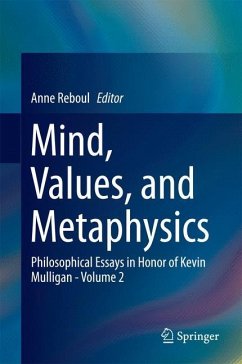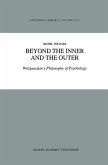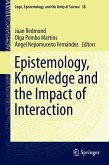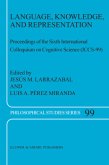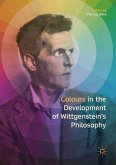There are three themed parts to this book: values, ethics and emotions in the first part, epistemology, perception and consciousness in the second part and philosophy of mind and philosophy of language in the third part. Papers in this volume provide links between emotions and values and explore dependency between language, meanings and concepts and topics such as the liar's paradox, reference and metaphor are examined.
This book is the second of a two-volume set that originates in papers presented to Professor Kevin Mulligan, covering the subjects that he contributed to during his career. This volume opens with a paper by Moya, who proposes that there is an asymmetrical relation between the possibility of choice and moral responsibility. The first part of this volume ends with a description of foolishness as insensitivity to the values of knowledge, by Engel. Marconi's article makes three negative claims about relative truth and Sundholm notes shortcomings of the English language for epistemology, amongst other papers. This section ends with a discussion of the term 'subjective character' by Nida-Rümelin, who finds it misleading.
The third part of this volume contains papers exploring topics such as the mind-body problem, whether theory of mind is based on simulation or theory and Künne shows that the most common analyses of the so-called 'Liar' paradox are wanting. At the end of this section, Rizzi introduces syntactic cartography and illustrates its use in scope-discourse semantics.
This second volume contains twenty nine chapters, written by both high profile and upcoming researchers from across Europe, North America and North Africa.
The first volume of this set has two main themes: metaphysics, especially truth-making and the notion of explanation and the second theme is the history of philosophy with an emphasis on Austrian philosophy.
This book is the second of a two-volume set that originates in papers presented to Professor Kevin Mulligan, covering the subjects that he contributed to during his career. This volume opens with a paper by Moya, who proposes that there is an asymmetrical relation between the possibility of choice and moral responsibility. The first part of this volume ends with a description of foolishness as insensitivity to the values of knowledge, by Engel. Marconi's article makes three negative claims about relative truth and Sundholm notes shortcomings of the English language for epistemology, amongst other papers. This section ends with a discussion of the term 'subjective character' by Nida-Rümelin, who finds it misleading.
The third part of this volume contains papers exploring topics such as the mind-body problem, whether theory of mind is based on simulation or theory and Künne shows that the most common analyses of the so-called 'Liar' paradox are wanting. At the end of this section, Rizzi introduces syntactic cartography and illustrates its use in scope-discourse semantics.
This second volume contains twenty nine chapters, written by both high profile and upcoming researchers from across Europe, North America and North Africa.
The first volume of this set has two main themes: metaphysics, especially truth-making and the notion of explanation and the second theme is the history of philosophy with an emphasis on Austrian philosophy.

